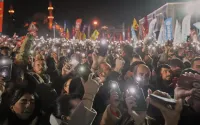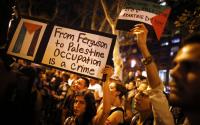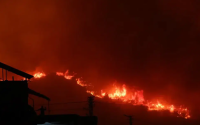Common Dreams / Published on Tuesday, August 28, 2007 by Agence France Presse
More than four million Iraqis have fled their homes because of sectarian violence, the largest population movement in the Middle East since Palestinians left the new state of Israel, the United Nations refugee agency said on Tuesday.
“An estimated 4.2 million Iraqis have been uprooted from their homes, with the monthly rate of displacement climbing to over 60,000 people compared to 50,000 previously,” UN High Commissioner for Refugees (UNHCR) spokeswoman Jennifer Pagonis told journalists.
More than two million Iraqis are displaced within their own country, with around half being uprooted following the February 2006 Samarra bombings, seen as the catalyst for the latest wave of sectarian conflict, the UNHCR said.
“Many are barely surviving in makeshift camps, inaccessible to aid workers for security reasons,” Pagonis warned.
Tens of thousands of Iraqis have been killed in sectarian conflict between Shiites and Sunnis, and Pagonis said many families were “choosing to leave ethnically mixed areas before they are forced to do so.”
More than 1.4 million have crossed into neighbouring Syria with between 500,000 and 750,000 heading into Jordan, the UNHCR said.
The UNHCR and UN children’s agency UNICEF have jointly appealed for help in paying for the education of 155,000 Iraqi refugee children, putting forward a figure of 129 million dollars to get them into schools for the 2007-2008 academic years.
This would allow 100,000 to go to school in Syria, 50,000 in Jordan, 2,000 in Egypt, 1,500 in Lebanon and 1,500 in other regional countries.
Coinciding with the refugee agency’s latest figures of an ever-growing exodus from Iraq, the United States announced it was giving 30 million dollars to the joint UNHCR-UNICEF education initiative.
“We encourage all potential donors to join us in supporting this appeal,” Ellen Sauerbrey, a US assistant secretary of state for population, refugees and migration, said in the Jordanian capital Amman.
Washington, which led the 2003 war on Iraq, has however been widely criticised for not doing enough in accepting Iraqi refugees waiting in Syria and Jordan for asylum in third countries.
Only 133 Iraqi refugees have been allowed into the United States since October, US State Department spokesman Sean McCormack said in July, blaming the slow pace on rigorous security vetting of candidates for resettlement.
Sauerbrey said she was in Jordan and Turkey this past week to discuss ways to expedite resettling Iraqi asylum-seekers.
“We expect that over 400 Iraqi refugees will travel to the US this month from Jordan, Turkey and Syria and will be resettled in many cities across our country,” she said.
“We are working towards welcoming close to 2,000 Iraqi refugees by the end of September.”
“We have a very strong feeling that it is our moral responsibility to do this (resettle Iraqis). Particularly we have a very moral obligation to those who are in danger because of their association with US forces,” Sauerbrey said.
She also admitted that the process has been “slow.”
“I am the first to admit my own frustration that we have not been able to move larger numbers more quickly,” she said, pledging that Washington planned to step up the process in 2008.
The number of Iraqi asylum seekers in Europe in the first half of 2007 rose to nearly 20,000, the same number received during the whole of 2006, according to the UNHCR.
Both Damascus and Amman have spoken of the burden posed by the refugees on their infrastructure.
Jordan has said that sheltering the influx costs the kingdom around one billion dollars a year.
The Christian relief organisation World Vision on Tuesday described the Iraqi refugees in Jordan and Syria as “forgotten people,” and called international aid agencies their “only hope.”






